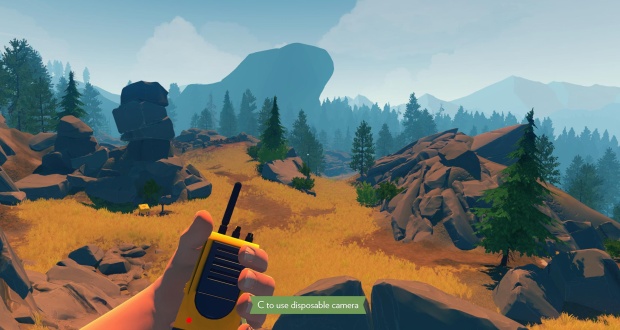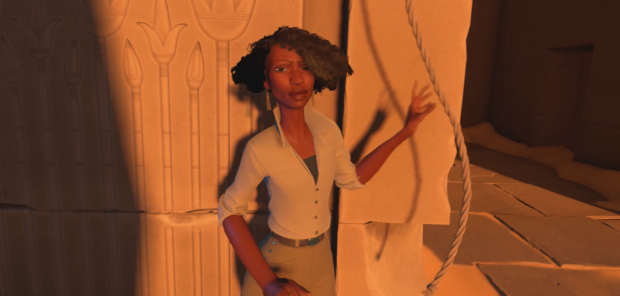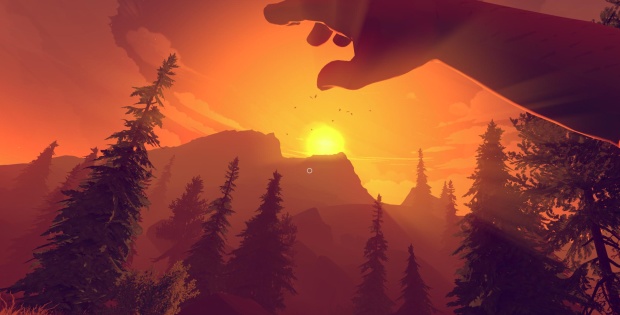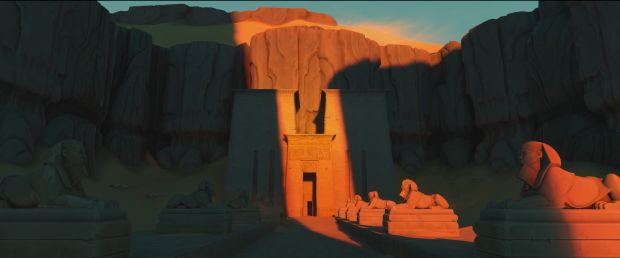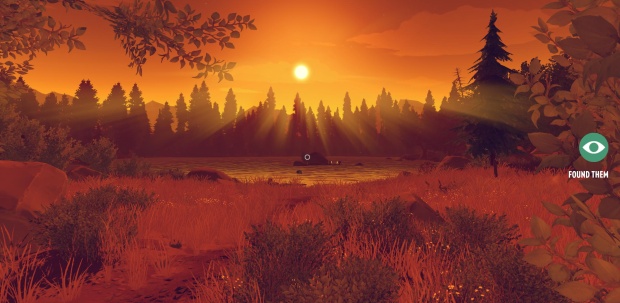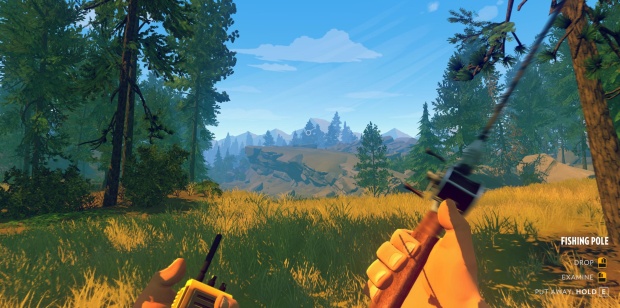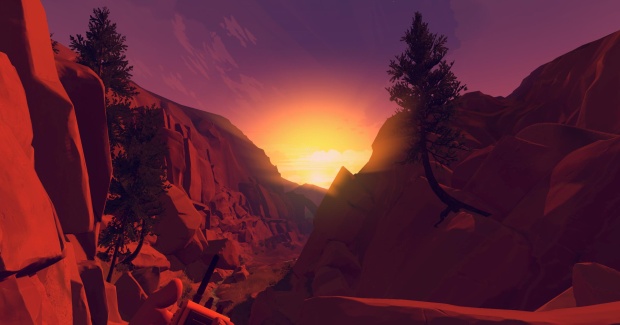Interview: Campo Santo talk to us about moving to Valve
Why and what's next
Campo Santo, creators of Firewatch and the forthcoming In The Valley Of Gods, announced last month that all twelve members of their studio were packing their bags and moving to Valve. The team are all currently in the process of relocating to Seattle, where Valley Of The Gods will be finished in Valve's Bellevue tower as a Valve game. So we caught up with studio heads Sean Vanaman and Jake Rodkin to find out much more.
As we chat, Sean has already moved up to Seattle and is inside Valve HQ, while Jake is manning the fort down in San Francisco, the (former?) studio split across the two locations as all twelve negotiate relocating their lives.
RPS: The obvious first question is how did the whole thing come about? Who spoke to whom first?
Sean Vanaman: Last year Jake and I were just doing a lot of talking about the future of the company and the future of our careers and what we wanted from Campo Santo. We went out in the world and we were talking to a lot of friends and partners about that. We knew we were making the Valley of Gods, we knew we were super excited about it; we knew we had big ambitions for the game. Both of us were doing multiple jobs, and me doing game development and studio direction, we realised the company probably wasn't going to be like - we were going to have to make some sort of changes. We just didn't know what we wanted to do yet, but the concept of not staying independent was not really on the table.
So we went out and got advice from folks who had shipped games and had done well and had built studios alongside of ours, like ours. We really went out and fielded perspectives and some of the perspectives that we fielded were from Robin Walker and Erik Johnson and Scott Lynch here at Valve. While sitting down to talk to them about the things we had on the table and they always said, 'Keep us in the loop about the future of the company'. We had a good relationship. That conversation pivoted to what ultimately became them acquiring the team.
RPS: That's quite a big jump though, right?
Sean Vanaman: Yes, for sure. When we were talking about the things that were important to us it was like, well, you know, Firewatch was this dream project where, for intents and purposes... Firewatch should not have worked. We obviously knew we wanted it to be commercial entertainment and we don't know how to make something that's not, but it was also a pet project. It was something that Jake and I really wanted to make, it was something that thanks to the guys at Panic we were able to make without compromise creatively and there wasn't a lot of stuff on the marketplace like it. In our brains it was like, look, if we can get this thing done and out and be happy with it that's the win. We organised ourselves to be able to build a company on top of any success that we might have. We tried to plan for success, but you don't really expect Firewatch to sell... over two-and-a-half million copies now.
The conversation was, 'Well, what have you got?' We said, 'This is what we're thinking about; the future, we're thinking about do we grow in one way? Do we keep going the way we're going this way? These are the sort of risks that we're going to take. Here are the things that are important to us. Here's the ambitions we have for the stuff we make.' We were just sharing that stuff and going, 'What would you guys do?' They said, 'I would come do that here.' They were pretty bold and straightforward about it. It was like, 'The way you guys talk about the way you want to grow the company and the things that are important to you and your careers is the way we talk and it feels like you guys would be a really good fit here, the whole team.'
They were very forthright about it and there wasn't a lot of playful courting or anything like that.
Jake Rodkin: It ended up with a handful of Valve people coming out and spending a couple of days at Campo talking to the team and talking about the project as well. It was a straightforward, but normal back and forth. It just came out of us having a lot of conversations together.
RPS: What's the situation? Is it Campo working almost like subcontractors inside Valve or have they bought out the company? How's it working?
Sean Vanaman: We're all Valve employees now, so for all intents and purposes Valve has got the team and owns the Valley of Gods, and the Valley of Gods is a Valve game so we're making it here.
RPS: What happens to Campo as a company that you owned?
Sean Vanaman: Technically the company still exists, but as an ongoing game developer is not happening. Jake and I technically still own Campo I guess.
RPS: Presumably Firewatch is still a big revenue stream, so is that now Valve's revenue? Do they get Firewatch too?
Sean Vanaman: We can't really talk about the terms of the deal unfortunately, but in terms of stuff with Firewatch none of our previous agreements have changed. We can't get too far into terms.
RPS: How do you convince twelve people to all agree to the same thing?
Sean Vanaman: We didn't do a sales job. We just spoke to what we thought we'd be able to accomplish, what folks' lives would look like, how it impacts them personally and impacts their families and let people kind of hash it out and ask a lot of questions and figure out if it was something they wanted to be a part of. It was a few months of that. At the end of the day Jake and I are going to have to decide what the hell the company's going to do because of the way it's structured and as co-founders, but it's just a lot of conversations and a lot of questions: what happens to this? What happens to that? Can I still work on this? Will I still work on that? Will this change? Will that change? So much about the way we work has just not changed; it's just we have a different office and the nuts and bolts of keeping a company open have gone away for Jake and I. That's touched everyone on the team though; everyone participated in running the company in some extent.
RPS: I know the feeling. We sold Rock Paper Shotgun last year and it's made such a big difference to my life! Not having to run the company and worry about the staff.
Jake Rodkin: It's going to be a nice experience to focus on making the video game without having to worry about the super structure surrounding us. I'm sure that's similar to your experience now being able to just do writing and other projects that you're interested in and not have to worry about the entity.
RPS: The one thing I would say is weird is with this thing that was ours, that we created from scratch... now I have a boss. I guess maybe you guys are going to be in a similar situation. Valve likes to bullshit about not having bosses - obviously they do, so you're going to have a boss. Is that going to be strange?
Sean Vanaman: It's not totally bullshit! The concept of a boss as like an authority figure doesn't exist, but you're responsible to the organisation and to the people you work with. You're responsible to the customer and to the project and to your co-workers. That shit didn't change. I didn't get to act like an asshole because I ran Campo Santo. I would have lost everyone. I didn't get to do whatever I wanted at Campo Santo for the same reason. I would classify that as acting like an asshole. You see that all the time, you see people who run studios from a very top-down authoritarian angle and it generally doesn't work out. They don't keep high quality senior teams together. The people who have moved on have moved on for professional reasons and still live inside of our Slack and we talk to them every day! Three people who worked on Firewatch who aren't with the company any more is Olly and Nels and Will Armstrong, and Paolo...
Jake Rodkin: And Patrick, but he's also around. Paolo went and made God of War. Paolo went and made Kratos's beard good.
Sean Vanaman: We talk to them almost every week and it's more like, 'Oh, my ambitions as a game developer don't really line up with what we want to do here, but I don't want to...' They're in the family, I guess. The point is there's not like an authority - Gabe Newell's not going to come and tell me what to do and if he did it's my responsibility to take it as feedback as a co-worker.
Jake Rodkin: I definitely don't think about it as having responsibility to the whims of a boss, but more responsibility to just being a good game developer. It is just responsibility to peers and co-workers is super important. It's not an issue of being responsible to no one or not having a boss, but it does end up feeling a lot more, just... It's difficult to explain. Just being responsible to your co-workers as peers is, honestly to me, like more meaningful to get right and also is still plenty of pressure. I don't feel like, there's no limits, do whatever you want. I feel more like I'm inside of a community of incredible game developers and I don't want to let them down with what I make, I think.
Sean Vanaman: Yes. To be honest, I'll maybe speak for Jake because I've known him for so long, but I think we kind of felt the same way at Telltale. I always felt the thing that motivated me to do what I was doing was my commitment to my co-workers and the project that we'd all agreed to work on and to the folks that would eventually pay for it. So we've kind of been doing that for ten years.
Jake Rodkin: The best part about making video games for me is working with a team of incredible people who are way better at everything else than you are, and then getting to collaborate with them on stuff and putting work into the game that they value and that they see as a great contribution. That's basically been the situation I've tried to keep myself in wherever I work, and I think that is going to hold true pretty foundationally there and that's what I'm interested in and excited about.
RPS: Talking about being a team at Valve, historically, and I think I'm right in saying this, every complete team that Valve have brought in has never gone on to make another game together. Is that something that you're cool with? That idea you're going to go and make Valley and then just sort of dissipate out into Valve, or are you going to try and stay together?
Sean Vanaman: I don't think there's a specific reason for that and also I know people who - I don't think there's a specific reason for that. I don't think a good company optimises towards breaking up teams. I think...
RPS: Oh no, I'm not saying they're going to go and do it aggressively! I'm just saying historically that's how it's always worked out just because, I think maybe, because of that rolling desk nature of Valve. That everyone goes, 'Oh, actually I'm quite interested in working on Half-Life 3 for a bit' and off they go. But are you going to try to keep your team together?
Sean Vanaman: I would say, 'To what end?' If we think it's emotionally and culturally valuable to keep the team together to make another game then - that would be the outcome of a bunch of people's individual choices. Which is not dissimilar to what it would have been at Campo. At the end of the Valley of Gods you look around and we sit down with everybody and go, 'How you feeling? Are you in or are you out?' We did that at the end of Firewatch. We don't really have the 'got to keep the band together' mentality. We have the we're a bunch of super senior highly motivated folks that are driven by different things and things that change over a lifetime.
Nothing could have pulled me off of Firewatch because it was important to me to be a big creative voice on an independent new IP game and see what that was like. That's what's important to me now and I think that's pretty - this is me speaking personally - right now I want to be a writer/collaborator on a big sprawling character driven adventure so that's what I'm doing. I don't really know what my personal ambitions will be at the end of the game and how those personal ambitions might line up with what's going on here.
A large chunk of the way I spent my time at Campo over the past five years was working with other indies and reaching out to folks and helping them get their studio set up or helping them find financing for their games or trying to talk indies out of taking crappy deals. I mean hours and hours and hours and that's something that's directly - I could directly apply that skill here. Something that we take really seriously at Valve is in the outreach and it's something that I've already dabbled in here. So it just kind of depends. No one on the team that I'm on would begrudge me pursuing those things if it was what satisfied me as a human being and also what made good sense for the enterprise as a whole. I love working with this group of folks and I don't see that changing so it's too hard to say.
RPS: From where do you think Valve are coming at this? Obviously Valve have the reputation for being a game developer that doesn't make games any more. Is this Valve pushing to get out of that space and get back into development?
Sean Vanaman: I feel like the main goal - and this is me speaking as Sean - as far as I can tell and what I am learning and what would really appeal to me around the process is that the company is super interested and focused on putting incredibly talented people in the best position to apply their skills to whatever they're working on for as long as possible. Adding people to the mix, pushing the company forward is really the main concern of any sort of personnel move or any acquisitions such as this. That's pretty straightforward.
Valve's not in a situation where they're looking to... I feel like the company's not trying to strategically optimise towards game development like, 'We need to be shipping more games because of X, Y and Z,' and somebody's sat in a strat meeting and said, 'How do we do that?' 'Go out and acquire good indie developers!' No, it's just about if you put enough super talented people in one place for long enough and treat them well they'll make really cool shit and that shit will generally be better than the stuff that your competitors are making. For all intents and purposes that was our goal at Campo; it was like just get great people in here and everything we make is going to pivot off of that. I think it was just they saw a dozen folks who were a good cultural fit in terms of just where we were in our careers and added a ton of individual expertise and said, 'We don't know what the upshot of this is going to be strategically. We can't figure out what you guys are going to make in five years or two years or six months, but it's probably going to be pretty good.'
Jake Rodkin: I will say that as our team is starting to set up in the Valve office over this month - this month is the month when everyone is moving in and getting desks and getting their lives readjusted - it is super thrilling that the place that we ended up doing that is in the same part of the office as the Artifact team. It's hard to talk about the inside of Valve versus the outside of Valve given that I still feel like I have a foot out the door and a foot in the door, but having us come into that office and just hitting the ground running on the game we're already working on, and being right next to a Valve team that is shipping a completely new project with a new set of mechanics and is just different to anything they've made at the same time, the energy level is very high right now. It's really exciting to be there at this exact moment in time. We're still brand new to this and we don't know what our lives are going to look like in a year or two or three years, but this exact moment is, for me at least, super thrilling personally as a game developer to be there.
RPS: Can you continue developing in Unity or are they going to ask you to move over to Source?
Sean Vanaman: Yes, we can continue developing, yes.
Jake Rodkin: Yes, yep.
RPS: That's really interesting.
Sean Vanaman: Again, it gets back to that thing: if the company at Valve says, 'Hey, you dozen folks are pretty good at making games. You guys should come and make games here,' and then the day you walk in the door they're like, 'Oh, you know how you make games? Don't make them that way. Make it a different way.' It's stuff like that. There's not a lot of political gamesmanship. It's not like, 'We do things this way.' At the same time I'm able to sit around and go, 'Oh, there are all these really good reasons why people make games in Source too.' You learn that just by talking to folks and learning. You're not dictated why it's done a certain way; it's up to you to have the wherewithal to learn how things are done and why they're being done that way and also to challenge it if you want to. We're not trying to be rebels staying in Unity. We're just trying to do what we know how to do.
RPS: Does this move mean that there's going to be a VR version of Valley or are they not worried about VR for this?
Sean Vanaman: That's going to be up to us in the same way it would have been if we were running Campo.
Jake Rodkin: Just like the engine, none of those things that were a requirement with us coming in the door, so if we get ourselves excited about something like that, cool. We considered weird VR opportunities for Firewatch over the course of development and none of them happened. It's not because we were like it will absolutely not happen or it absolutely must happen; it just kind of came down to what the team thought was cool and was interesting.
RPS: You've kind of alluded to this already a lot, but can you talk a bit more about the opportunities that being there is going to give you that you maybe wouldn't have had access to before?
Sean Vanaman: I don't know, Jake, tell me how you feel about this, but there's two things. One is I personally have never worked in a spot where I felt like my creative ambition, my creative skills were the limiting factor on what I was able to make. It's always been money and access and those two factors are very different now, so I still feel like the opportunities we have are hard limited by time we have as humans, motivated time. Technically you could make a game forever, but you're not going to be motivated past a certain point. Then my ability to make those things happen.
Having to be very deliberate about how I spend my time hasn't changed so that still feels like the limiting factor. If we wanted to have an insane voice budget - with In The Valley of Gods as an independent studio we could have done that. I could have structured the business around, 'we're only going to get the most A-tier talent on this game and by A-tier I mean go get a bunch of famous people' or something. I never felt limited in that way. I still just feel limited by how I spend my time. I don't know, what do you think, Jake?
Jake Rodkin: Yes, I think we're walking into that building the same twelve people at the start, being literally the same twelve humans who moved the room that we're in from San Francisco to Seattle. Just right off the bat from moment zero we're now surrounded by a couple of hundred people who also do the same thing that we do and are fantastic at it and are really interested in just contributing feedback, and even just being ambiently around.
Even just that, that smallest step is different than what we had before in a way that I think is going to be really exciting for our team who's been running basically out of a small room with all of us together. Just being able to show what you're working on to someone down the hall who usually is working on Dota or works on Artifact. What do you think about this? What's interesting to you about what we're working on and what's exciting and just getting feedback from tons and tons more peers.
Just that is a tangible change that I'm excited about and it's a thing that we gave up when we started Campo that I actually miss from being on bigger teams, and it's one of those things that I'm really thrilled about having happen. Obviously also some of those people could end up coming on to our project in the future, but just that one tangible thing is the tip of the iceberg that I've already experienced and is awesome.
RPS: What about the other way round? What is it that you guys bring that they didn't already have?
Sean Vanaman: I hate that I have to be like thoughtful now in interviews because I keep making strangers mad. It was so much easier when I knew I was just making Campos mad!
Jake Rodkin: Or you could just say some sort of garbage.
Sean Vanaman: I could be like, oh, you mean good writing?!
RPS: Now they've got rid of that awful Chet bloke.
Sean Vanaman: Yes, just Chet and Erik, what chumps those guys are!
We have a different perspective. The past five years of indie game development has been really weird. We've probably done more interfacing with a lot of the customer side Steam features than most people who work here. I think it's mostly perspective that we're probably bringing. I would bring our game development chops which are substantial - I'm speaking more for everyone when I say that, not necessarily myself. Our game development chops are as good as anyone's and we're pretty confident in that, but people here are really fucking good at making video games so it's not like we're going to come in and show people how to do stuff. I think it's mostly perspective. I think that's one of the greatest things they get, and the energy around having a new team like ours show up. We're pretty energetic.
Jake Rodkin: Yes, we come in with a project that we already have momentum on. I can only think about the things that I'm excited to see how they play out. A team like ours who is already a fully formed unit that was built outside of Valve in a world where Steam exists and where we've been interfacing with Steam from the outside and we've been shipping games from the outside, coming in with a project that we're all excited about with our own internal momentum and then bringing that inside of their studio... I can't predict what that will mean, but it's a fun experience to be a part of.
RPS: How are you going to cope with Seattle weather having lived in San Francisco?
Sean Vanaman: Let me tell you a little something about this Mr Walker, so people in this fucking town...
Jake Rodkin: Where do you live? Do you live in England? Is that correct?
RPS: Correct.
Sean Vanaman: Yes! All people do in this goddamn town and outside, everyone just wants to talk about the weather! Let me tell you something: it has been sunny and 68 degrees for a week straight. I'm staring right now past downtown Seattle at the Olympic National Park mountain range that is 55 miles away as the crow flies and it is clear as the day is long!
RPS: I prepared for this question and I can tell you that from next Tuesday it's going to rain for all eternity in Seattle.
Sean Vanaman: The thing is it's not really raining, it's just sort of like misting. You're just in a mist. It's not like an oppressive downpour so I think it will be fine. I don't know if you know this, but we also go to Hawaii once a week every year or for a week every year so that's going to help.
RPS: Soak up a week of sun and bring it back with you.
Sean Vanaman: As I walk down the sidewalk I don't have to dodge a menagerie of robot controlled scooters so that's going to be nice - I'll trade the weather for not living in the...
Jake Rodkin: Not living in a pile of scooters.
Sean Vanaman: Not living in the pile of scooters that is now San Francisco. Those fucking scooters man, you've got to get out of there.
Jake Rodkin: I'm working on it, man.
RPS: Thanks for your time.


